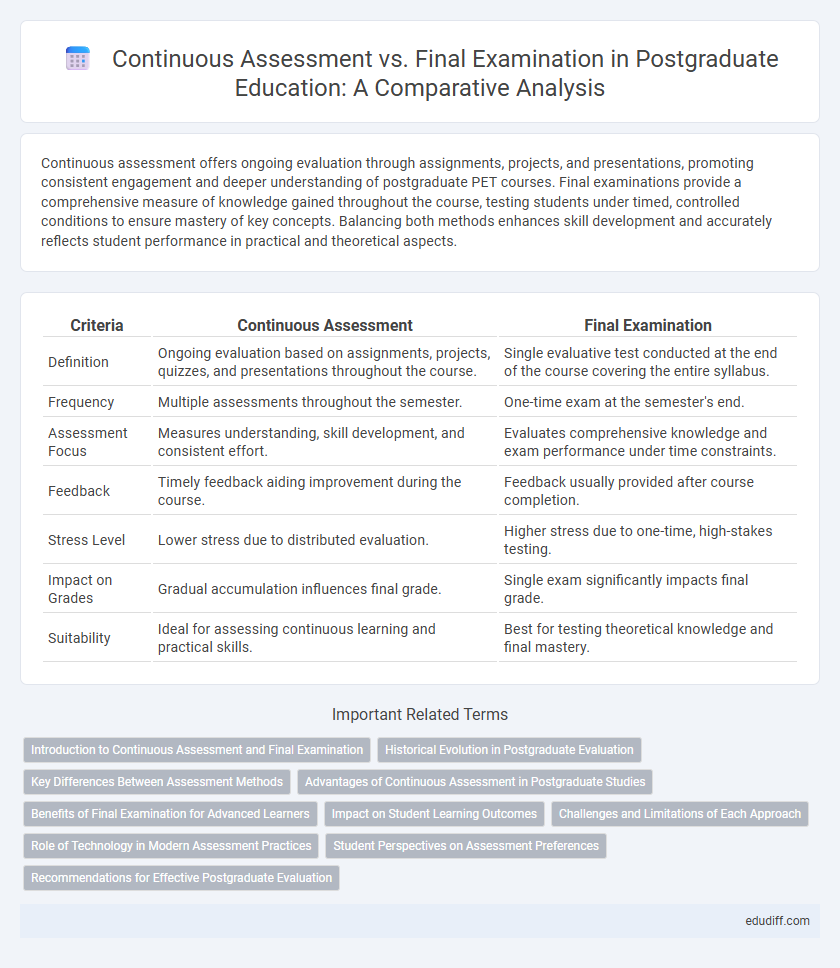Continuous assessment offers ongoing evaluation through assignments, projects, and presentations, promoting consistent engagement and deeper understanding of postgraduate PET courses. Final examinations provide a comprehensive measure of knowledge gained throughout the course, testing students under timed, controlled conditions to ensure mastery of key concepts. Balancing both methods enhances skill development and accurately reflects student performance in practical and theoretical aspects.
Table of Comparison
| Criteria | Continuous Assessment | Final Examination |
|---|---|---|
| Definition | Ongoing evaluation based on assignments, projects, quizzes, and presentations throughout the course. | Single evaluative test conducted at the end of the course covering the entire syllabus. |
| Frequency | Multiple assessments throughout the semester. | One-time exam at the semester's end. |
| Assessment Focus | Measures understanding, skill development, and consistent effort. | Evaluates comprehensive knowledge and exam performance under time constraints. |
| Feedback | Timely feedback aiding improvement during the course. | Feedback usually provided after course completion. |
| Stress Level | Lower stress due to distributed evaluation. | Higher stress due to one-time, high-stakes testing. |
| Impact on Grades | Gradual accumulation influences final grade. | Single exam significantly impacts final grade. |
| Suitability | Ideal for assessing continuous learning and practical skills. | Best for testing theoretical knowledge and final mastery. |
Introduction to Continuous Assessment and Final Examination
Continuous assessment in postgraduate education involves evaluating students' performance through various assignments, projects, and regular tests throughout the course, fostering consistent engagement and comprehensive understanding. Final examinations serve as a cumulative evaluation method, testing knowledge and skills acquired over the entire program in a timed, often high-pressure setting. Balancing continuous assessment with final examinations provides a holistic measure of student learning, combining ongoing feedback with summative evaluation.
Historical Evolution in Postgraduate Evaluation
Continuous assessment in postgraduate evaluation evolved from traditional reliance on final examinations, reflecting shifts in educational philosophies emphasizing comprehensive skill development and ongoing feedback. Historical trends indicate that continuous assessment gained prominence in the late 20th century, aligning with competency-based education and constructivist theories. This evolution marks a transition from summative, high-stakes testing towards formative strategies that foster deeper learning and critical thinking in graduate studies.
Key Differences Between Assessment Methods
Continuous assessment evaluates postgraduate students through multiple assignments, projects, and quizzes over a semester, promoting consistent engagement and deeper learning. Final examinations focus on a single comprehensive test assessing cumulative knowledge at the end of a course, emphasizing short-term memorization and time-constrained performance. Continuous assessment provides ongoing feedback and reduces exam-related stress, while final exams offer a standardized measure of overall understanding and academic discipline mastery.
Advantages of Continuous Assessment in Postgraduate Studies
Continuous assessment in postgraduate studies promotes consistent engagement and deeper understanding by evaluating students through varied methods such as essays, presentations, and research projects. This approach reduces exam-related anxiety, allowing for more accurate measurement of knowledge and skills over time. Continuous assessment also encourages the development of critical thinking and practical application, essential for advanced academic and professional success.
Benefits of Final Examination for Advanced Learners
Final examinations for advanced learners offer a comprehensive evaluation of student knowledge, promoting critical thinking and synthesis of complex concepts essential for postgraduate success. These exams provide a standardized measure of competency, ensuring academic rigor and consistency across diverse cohorts. Emphasizing final assessments encourages time management and deep study habits, crucial skills for professional and academic advancement.
Impact on Student Learning Outcomes
Continuous assessment promotes consistent engagement and deeper understanding by providing ongoing feedback, which enhances critical thinking and knowledge retention in postgraduate students. Final examinations primarily test memory and the ability to perform under time constraints, often causing stress that can negatively affect performance and fail to accurately reflect comprehensive learning outcomes. Research indicates that blending continuous assessment with final exams yields better overall student achievement and skill development in advanced academic programs.
Challenges and Limitations of Each Approach
Continuous assessment faces challenges such as increased workload for instructors, potential subjectivity in grading, and difficulty ensuring consistent evaluation standards across diverse assignments. Final examinations present limitations including high-stress conditions for students, limited scope to assess practical skills or critical thinking, and risks of academic dishonesty during high-stakes testing. Both approaches struggle with balancing comprehensive evaluation and fair measurement of student learning outcomes in postgraduate education.
Role of Technology in Modern Assessment Practices
Technology enhances continuous assessment by enabling real-time feedback through digital platforms and interactive tools, promoting consistent student engagement and personalized learning paths. Online examination systems incorporate advanced proctoring software, ensuring integrity and fairness in final examinations while offering flexibility in scheduling and location. Integration of AI-driven analytics supports educators in monitoring progress and identifying areas for improvement across both continuous assessments and final exams.
Student Perspectives on Assessment Preferences
Students often prefer continuous assessment over final examinations due to its ability to reduce stress and provide ongoing feedback that enhances learning. Continuous assessment methods such as projects, presentations, and quizzes enable students to demonstrate understanding progressively, aligning with diverse learning styles. Conversely, final examinations may induce anxiety and emphasize rote memorization, which some postgraduate students find less effective for demonstrating comprehensive subject mastery.
Recommendations for Effective Postgraduate Evaluation
Continuous assessment enhances in-depth understanding and critical thinking by providing ongoing feedback and opportunities for skill development throughout the semester. Final examinations effectively gauge comprehensive knowledge under timed conditions but may not fully reflect a student's overall capabilities or learning progression. A balanced postgraduate evaluation strategy that integrates continuous assessment with final exams ensures a holistic measurement of academic performance and supports sustained intellectual growth.
Continuous Assessment vs Final Examination Infographic

 edudiff.com
edudiff.com